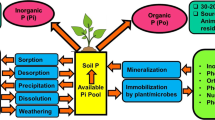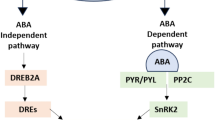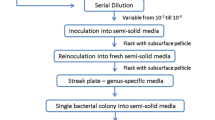Abstract
The current study aimed to characterize the contribution of bacterium CP17 in zinc (Zn) biofortification in wheat under saline and non-saline conditions. This bacterial strain effectively solubilized Zn and tolerated up to 20% NaCl concentration. The Zn-solubilization potential was also quantified using AAS in a liquid broth supplemented with zinc oxide and zinc carbonate at various NaCl concentrations. Lowering the pH of liquid broth and analyzing a wide range of organic acids (thioacetic acid, glutamic acid, carboxylic acid, propionic acid, and so on) using UPLC-MS provided mechanistic insight for zinc solubilization. This strain was also shown to possess plant probiotic characteristics like phosphate solubilization, production of siderophore, indole acetic acid (IAA), exopolysaccharide (EPS), ACC deaminase, and ammonia. CP17 was identified as a Pseudomonas protegens based on the 16S rRNA gene analysis. In addition, the amplified product of the ACC deaminase producing gene (acdS) provided a molecular indication of the strain’s endurance towards stress. The towel paper assay confirmed that the inoculation of Pseudomonas protegens CP17 significantly increased wheat seedlings’ germination, growth, and biomass under different NaCl concentrations (0 mM, 100 mM, and 150 mM). Afterward, In situ pot experiment study was designed with the inoculation of Pseudomonas protegens in wheat under saline and non-saline conditions. The harvested wheat plants showed an elevated pattern of zinc content in the grain (i.e. 24.33 and 29.33mg/kg), straw (i.e. 45.73 and 50.23mg/kg) and soil (i.e. 0.978 and 1.32mg/kg) under saline and non-saline conditions, respectively and shown significant improvement over control. The results of the pot study revealed the amelioration in plant health, yield and uptake of available zinc from rhizospheric soil to straw and grain, along with enhanced dehydrogenase and phosphatase activities of rhizospheric soil under saline and non-saline conditions. This study supports the integrative role of Pseudomonas protegens CP17 as a bioinoculant for the efficacious strategy of zinc biofortification and growth promotion in wheat and ensures sustainable nutrient quality production under salinity stress.








Similar content being viewed by others
References
Abbas R, Rasul S, Aslam K, Baber M, Shahid M, Mubeen F, Naqqash T (2019) Halotolerant PGPR: A hope for cultivation of saline soils. J King Saud Uni Sci 31:1195–1201. 10.016/j.jksus. 2019.02.019
Andreolli M, Zapparoli G, Angelini E, Lucchetta G, Lampis S, Vallini G (2019) Pseudomonas protegens MP12: A plant growth-promoting endophytic bacterium with broad-spectrum antifungal activity against grapevine phytopathogens. Microbiol Res 219:123–131. doi: https://doi.org/10.1016/j.micres.2018.11.003
Aon MA, Cabello MN, Sarena DE, Colaneri AC, Franco MG, Burgos JL, Cortassa SI (2001) Spatio-temporal patterns of soil microbial and enzymatic activities in an agricultural soil. Appl Soil Ecol 18:239–254. doi:https://doi.org/10.1016/S0929-1393(01)00153-6
Bapiri A, Asgharzadeh A, Mujallali H, Khavazi K, Pazira E (2012) Evaluation of Zinc solubilization potential by different strains of Fluorescent Pseudomonads. J Appl Sci Environ Manag 16:295–298
Barnawal D, Bharti N, Maji D, Chanotiya CS, Kalra A (2014) ACC deaminase containing Arthrobacter protophormiae induces NaCl stress tolerance through reduced ACC oxidase activity and ethylene production resulting in improved nodulation and mycorrhization in Pisum sativum. J Plant Physiol 171:884–894. doi:https://doi.org/10.1016/j.jplph.2014.03.007
Bates LS, Waldren RP, Teare ID (1973) Rapid determination of free proline for water-stress studies. Plant Soil 39:205–207
Bazzicalupo M, Fani R (1996) The use of RAPD for generating specific DNA probes for microorganisms. Methods Mol Biol 50:155–175. doi:https://doi.org/10.1385/0-89603-323-6:155
Bhart N, Pandey SS, Barnawal D, Patel VK, Kalra A (2016) Plant growth promoting Rhizobacteria Dietzia natronolimnaea modulates the expression of stress responsive genes providing protection of wheat from salinity stress. Sci Rep 6:1038–1044. doi:https://doi.org/10.1038/srep34768
Biari A, Gholami A, Rahmani HA (2008) Growth promotion and enhanced nutrient uptake of maize (Zea mays L.) by application of plant growth promoting rhizobacteria in arid region of Iran. Biol Sci 8:1015–1020. doi: https://doi.org/10.3923/jbs.2008.1015.1020
Blaha D, Prigent-Combaret C, Mirza MS, Moenne-Loccoz Y (2006) Phylogeny of the 1-aminocyclopropane-1-carboxylic acid deaminase-encoding gene acdS in phytobeneficial and pathogenic Proteobacteria and relation with strain biogeography. FEMS Micro Ecol 56:455–470. doi:https://doi.org/10.1111/j.1574-6941.2006.00082
Bouain N, Shahzad Z, Rouached A, Khan GA, Berthomieu P, Abdelly C, Poirier Y, Rouached H (2014) Phosphate and zinc transport and signalling in plants toward a better understanding of their homeostasis interaction. Ext Bot 65:5725–5741. doi:https://doi.org/10.1093/jxb/eru314
Casida L, Klein D, Santoro T (1964) Soil Dehydrogenase Activity. Soil Sci 98:371–376. doi: https://doi.org/10.1097/00010694-196412000-00004
Cappuccino JC, Sherman N (1992) Microbiology: A Laboratory Manual, third edn. Benjamin/cummings Pub, New York
Chang P, Gerhardt KE, Huang XD, Yu XM, Glick BR, Gerwing PD, Greenberg BM (2014) Plant growth-promoting bacteria facilitate the growth of barley and oats in salt-impacted soil implications for phytoremediation of saline soils. Int J Phytoremediation 16:1133–1147. doi:https://doi.org/10.1080/15226514.2013.821447
Cole MB, Augustin MA, Robertson MJ, Manners JM (2018) The science of food security. NPJ Sci Food 2:14. doi:https://doi.org/10.1038/s41538-018-0021-9
Costa OY, Raaijmakers JM, Kuramae EE (2018) Microbial extracellular polymeric substances: ecological function and impact on soil aggregation. Front Microbiol 9:1636. doi:https://doi.org/10.3389/fmicb.2018.01636
Costerousse B, Schonholzer-Mauclaire L, Frossard E, Thonar C (2017) Identification of heterotrophic zinc mobilization processes among bacterial strains isolated from wheat rhizosphere (Triticum aestivumL.). Appl Environ Microl 84:e01715–e01717. doi: https://doi.org/10.1128/AEM.01715-17
Darko E, Gierczik K, Hudak O, Forgo P, Pal M, Turkosi E, Kovacs V, Dulai S, Majlath I, Molnar I, Janda T (2017) Differing metabolic responses to salt stress in wheat-barley addition lines containing different 7H chromosomal fragments. PLoS ONE 120174170. doi:https://doi.org/10.1371/journal.pone.0174170
Dinesh R, Srinivasan V, Hamza S, Sarathambal C, Gowda SA, Ganeshamurthy AN, Gupta SB, Nair VA, Subila KP, Lijina A, Divya VC (2018) Isolation and characterization of potential Zn solubilizing bacteria from soil and its effects on soil Zn release rates, soil available Zn and plant Zn content. Geoderma 321:173–186
Dionisio-Sese ML, Tobita S (1998) Antioxidant responses of rice seedlings to salinity stress. Plant Sci 135:1–9. doi: https://doi.org/10.1016/S0168-9452(98)00025-9
Donate-Correa J, Leon-Barrious M, Perez-galdona R (2005) Screening for plant growth-promoting rhizobacteria in Chamaecytisus proliferus (tagasaste), a forage tree-shrub legume endemic to the Canary Islands. Plant Soil 266:261–272. doi:https://doi.org/10.1007/s11104-005-0754-5
Etesami H, Alikhani HA, Akbari AA (2009) Evaluation of plant growth hormones production (IAA) ability by Iranian soils rhizobial strains and effects of superior strains application on wheat growth indexes. World Appl Sci J 6:1576–1584
Fasim F, Ahmed N, Parsons R, Gadd GM (2002) Solubilization of zinc salts by a bacterium isolated from the air environment of a tannery. FEMS Microb lett 213:1–6. doi:https://doi.org/10.1111/j.1574-6968.2002.tb11277.x
Fiske CH, Subbarow Y (1925) The colorimetric determination of phosphorus. J Biol Chem 66:375–400. doi:https://doi.org/10.1016/s0021-9258(18)84756-1
Heath R, Packer L (1968) Photoperoxidation in isolated chloroplasts. I. Kinetics and stoichiometry of fatty acid peroxidation. Arch Biochem Biophys 125:189–198. doi:https://doi.org/10.1016/0003-9861(68)90654-1
Hefferon K (2019) Biotechnological Approaches for Generating Zinc-Enriched Crops to Combat Malnutrition. Nutrients 11:253–259. doi:https://doi.org/10.3390/nu11020253
Hiscox JD, Israelstam GF (1979) A method for the extraction of chlorophyll from leaf tissue without maceration. Can J Bot 57:1332–1334. doi:https://doi.org/10.1139/b79-163
Hu Y, Schmidhalter U (2005) Drought and salinity: A comparison of their effects on mineral nutrition of plants. J Plant Nutr Soil Sci 168:541–549. doi:https://doi.org/10.1002/jpln.200420516
Imadi SR, Shah SW, Kazi AG, Azooz MM, Ahmad P (2016) Phytoremediation of Saline Soils for Sustainable Agricultural Productivity. In: Ahmad P (ed) Plant Metal Interaction: Emerging Remediation Techniques. Elsevier, pp 455–468
Iqbal M, Irshad M, Nadeem M, Fatima T, Itrat AB (2018) Salinity effects on wheat (Triticum aestivum L.) characteristics A Review Article. Int J Agron Agri R 12:1–15
Jha B, Gontia I, Hartmann A (2012) The roots of the halophyte Salicornia brachiataare a source of new halotolerant diazotrophic bacteria with plant growth- promoting potential. Plant Soil 356:265–277. doi: https://doi.org/10.1007/s11104-011-0877-9
Jiang C, Zu C, Lu D, Zheng Q, Shen J, Wang H, Li D (2017) Effect of exogenous selenium supply on photosynthesis, Na + accumulation and antioxidative capacity of maize (Zea mays L.) under salinity stress. Sci Rep 7:42039. doi: https://doi.org/10.1038/srep42039
Kamran S, Shahid I, Baig DN, Rizwan M, Malik KA, Mehnaz S (2017) Contribution of zinc solubilizing bacteria in growth promotion and zinc content of wheat. Front Microbiol 8:2593. doi: https://doi.org/10.3389/fmicb.2017.02593
Kearl J, McNary C, Lowman JS, Mei C, Aanderud ZT, Smith ST, West J, Colton E, Hamson M, Nielsen BL (2019) Salt-tolerant halophyte rhizosphere bacteria stimulate growth of alfalfa in salty soil. Front Microbiol 10:1849. doi: https://doi.org/10.3389/fmicb.2019.01849
Khan A, Joshi M, Singh AV (2020a) Rhizospheric Microbial Community: Ecology, Methods, and Functions. In: Sharma SK, Singh UB, Sahu PK, Singh HV, Sharma PK (eds) Rhizosphere Microbes. Springer, Singapore, pp 127–148. doi: https://doi.org/10.1007/978-981-15-9154-9_5
Khan A, Singh AV (2021) Multifarious effect of ACC deaminase and EPS producing Pseudomonas sp. and Serratia marcescens to augment drought stress tolerance and nutrient status of wheat. World J Microbiol and Biotechnol 37(12):1–17. DOI: https://doi.org/10.1007/s11274-021-03166-4
Khan A, Singh J, Upadhayay VK, Singh AV, Shah S (2019) Microbial Biofortification: A Green Technology through Plant Growth Promoting Microorganisms. In: Shah S, Ramanan V, Prasad R (eds) Sustainable Green Technologies for Environmental Management. Springer, Singapore, pp, pp 255–269. doi: https://doi.org/10.1007/978-981-13-2772-8_13
Khan A, Upadhayay VK, Panwar M, Singh AV (2020b) 10 Soil Microbiota: A Key Bioagent for Revitalization of Soil Health in Hilly Regions. In: Goel R, Soni R, Suyal DC (eds) Microbiological Advancements for Higher Altitude Agro-Ecosystems & Sustainability. Springer, Singapore, pp 183–200. doi: https://doi.org/10.1007/978-981-15-1902-4_10
Lindsay WL, Norvell WA (1978) Development of a DTPA soil test for zinc, iron, manganese and copper. Soil Sci Am J 42:421–428
Lucas JA, Garcia-Cristobal J, Bonilla A, Ramos B, Gutierrez-Manero J (2014) beneficial rhizobacteria from rice rhizosphere confers high protection against biotic and abiotic stress inducing systemic resistance in rice seedlings. Plant Physiol Biochem 82:44–53. doi:https://doi.org/10.1016/j.plaphy.2014.05.007
Luck H (1965) Catalase. In: Bergmeyer HU (ed) Method of Enzymatic Analysis. Academic Press, New York and London, pp 885–894
Machado RMA, Serralheiro RP (2017) Soil salinity: Effect on vegetable crop growth. Management practices to prevent and mitigate soil salinization. Horticulturae 3:30. doi:https://doi.org/10.3390/horticulturae3020030
Mishra GS, Sapre S, Kachare S, Tiwari S (2017) Molecular diversity of 1- aminocyclopropane-1-carboxylate (ACC) deaminase producing PGPR from wheat (Triticum aestivum L.) rhizosphere. Plant Soil 414:213–227. doi:https://doi.org/10.1007/s11104-016-3119-3
Mitra S, Pramanik K, Ghosh PK, Soren T, Sarkar A, Dey RS, Pandey S, Maiti TK (2018) Characterization of Cd resistant Klebsiella michiganensis MCC3089 and its potential for rice seedling growth promotion under Cd stress. Microbiol 210:13–25. doi: https://doi.org/10.1016/j.micres.2018.03.003
Mumtaz MZ, Ahmad M, Jamil M, Hussain T (2017) Zinc solubilizing Bacillus spp. potential candidates for biofortification in maize. Microbiol 202:51–60. doi: https://doi.org/10.1016/j.micres.2017.06.001
Nasrin S, Mannan MA (2019) Impact of salinity on seed germination and seedling growth of tomato. J Biosci Agric Res 21:1737–1748. doi: https://doi.org/10.18801/jbar.210119.212
Nautiyal CS, Mehta S, Pushpangadan P (2003) Composition for qualitative screening of phosphate solubilizing microorganisms and a quantitative method for screening microorganisms. U.S. Patent, US 6, 638, 730 B2
Parveen H, Singh AV, Khan A, Prasad B, Pareek N (2018) Influence of plant growth promoting rhizobacteria on seed germination and seedling vigour of green gram. Int J Chem Stud 6:611–618
Patten CL, Glick BR (2002) Role of Pseudomonas putida indole acetic acid in development of the host plant root system. Appl Environ Microbiol 68:3795–3801. doi: https://doi.org/10.1128/AEM.68.8.3795-3801.2002
Penrose DM, Glick BR (2003) Methods for isolating and characterizing ACC deaminase containing plant growth promoting rhizobacteria. Physiol plant 118:10–15. doi:https://doi.org/10.1034/j.1399-3054.2003.00086
Premono ME, Moawad AM, Vlek PLG (1996) Effect of phosphate- solubilizing Pseudomonas putidaon the growth of maize and its survival in the rhizosphere. Indones. J Agric Sci 11:13–23
Ramesh A, Sharma SK, Sharma MP, Yadav N, Joshi OP (2014) Inoculation of zinc solubilizing Bacillus aryabhattai strains for improved growth, mobilization and biofortification of zinc in soybean and wheat cultivated in vertisols of central India. Appl Soil Ecol 73:87–96. doi: https://doi.org/10.1016/j.apsoil.2013.08.009
Sapre S, Gontia-Mishra I, Tiwari S (2018) Klebsiella sp. confers enhanced tolerance to salinity and plant growth promotion in oat seedlings (Avena sativa). Microbiol Res 206:25–32. doi:https://doi.org/10.1016/j.micres.2017.09.009
Schwyn B, Neilands JB (1987) Universal chemical assay for the detection and determination of siderophores. Anal Biochem 160(87):47–56. doi: https://doi.org/10.1016/0003-
Shahid M, Akram MS, Khan MA, Zubair M, Shah SM, Ismail M, Shabir G, Basheer S, Aslam K, Tariq M (2018) A phytobeneficial strain Planomicrobium sp. MSSA-10 triggered oxidative stress responsive mechanisms and regulated the growth of pea plants under induced saline environment. J Appl Microbiol 124:1566–1579. doi: https://doi.org/10.1111/jam.13732
Shakeel M, Rais A, Hassan MN, Hafeez FY (2015) Root associated Bacillus sp. improves growth, yield and zinc translocation in basmati rice (Oryza sativa) varieties. Front Microbiol 6:1280. doi.10.3389/fmicb.2015.01286
She D, Sun X, Gamareldawla AH, Nazar EA, Hu W, Edith K (2018) Benefits of soil biochar amendments to tomato growth under saline water irrigation. Sci Rep 8:14743. doi: https://doi.org/10.1038/s41598-018-33040-7
Shen J, Yuan L, Zhang J, Li H, Bai Z, Chen X, Zhang W, Zhang F (2011) Phosphorus dynamics: from soil to plant. Plant Physiol 156:997–1005. doi: https://doi.org/10.1104/pp.111.175232
Siddikee MA, Glick BR, Chauhan PS, Jong Yim W, Sa T (2011) Enhancement of growth and salt tolerance of red pepper seedlings (Capsicum annuum L.) by regulating stress ethylene synthesis with halotolerant bacteria containing 1- aminocyclopropane-1-carboxylic acid deaminase activity. Plant Physiol Biochem 49:427–434. doi:https://doi.org/10.1016/j.plaphy.2011.01.015
Singh AV, Khan A, Joshi M (2020) Plant–Microbe Interaction: A Sustainable Strategy to Elevate Salinity Tolerance in Plants. In: Sharma A (ed)Microbes and Signaling Biomolecules Against Plant Stress Springer, Singapore. pp.37–54. doi: https://doi.org/10.1007/978-981-15-7094-0_3
Singh CM, Sharma PK, Premkishore PK, Mishra AP, Singh AP, Verma R, Raha P (2011) Impact of integrated nutrient management on growth, yield and nutrient uptake by wheat (Triticum aestivum L.). Asian J Agric Res 5:76–82. doi10.3923/ajar.2011.76.82
Singh J, Singh AV, Prasad B, Shah S (2017) Sustainable agriculture strategies of wheat biofortification through microorganisms. In: Kumar A, Kumar A, Prasad B (eds) Wheat A premier Food Crop. Kalyani publishers, New Delhi, pp 374–391
Skujins JJ, Braal L, Mclaren AD (1962) Characterization of phosphatase in a terrestrial soil sterilized with an electron beam. Enzymologia 25:125–133
Subramanian KS, Tenshia V, Jayalakshmi K, Ramach V (2009) Role of arbuscular mycorrhizal fungus (Glomus intraradices) (fungus aided) in zinc nutrition of maize. J Agric Biotech Sustain Dev 1:029–038
Sunithakumari K, Padma Devi SN, Vasandha S (2016) Zinc solubilizing bacterial isolates from the agricultural fields of Coimbatore, Tamil Nadu, India. Curr Sci 110:196–205
Tabatabai MA, Bremner JM (1969) Use of p-nitrophenyl phosphate for assay of soil phosphatase activity. Soil Biol Biochem 1:301–307. doi: https://doi.org/10.1016/0038-0717(69)90012-1
Thombre RS, Shinde VD, Oke RS, Dhar SK, Shouche YS (2016) Biology and survival of extremely halophilic archaeon Haloarculam arismortui RR12 isolated from Mumbai salterns, India in response to salinity stress. Sci Rep 6:25642. doi:https://doi.org/10.1038/srep25642
Torre-Gonzalez A, Navarro-Leon E, Albacete A, Blasco B, Ruiz JM (2017) Study of phytohormone profile and oxidative metabolism as key process to identification of salinity response in tomato commercial genotypes. J Plant Physiol 216:164–173. doi:https://doi.org/10.1016/j.jplph.2017.05.016
Upadhayay VK, Singh AV, Khan A, Pareek N (2021) Influence of zinc solubilizing bacterial co-inoculation with zinc oxide supplement on rice plant growth and Zn uptake. Pharm Innov J 10(7):113–116
Upadhayay VK, Singh AV, Pareek N (2018) An Insight in Decoding the Multifarious and Splendid Role of Microorganisms in Crop Bio fortification. Int J Curr Microbial Appl Sci I7:2407–2418. doi: https://doi.org/10.20546/ijcmas.2018.706.286
Vimal SR, Gupta J, Singh JS (2018) Effect of salt tolerant Bacillus sp. and Pseudomonas sp. on wheat (Triticum aestivum L.) growth under soil salinity: A comparative study. Microbiol Res. doi:https://doi.org/10.4081/mr.2018.7462
Wang N, Qiu W, Dai J, Guo X, Lu Q, Wang T, Li S, Liu T, Zuo YM (2019) AhNRAMP1 enhances manganese and zinc uptake in plants. Front Plant Sci 10:415. doi: https://doi.org/10.3389/fpls.2019.00415
Weatherley PE (1950) Studies in the water relations of the cotton plant. I. The field measurements of water deficits in leaves. New Phytol 49:81–97. https://doi.org/10.1111/j.1469-8137.1950.tb05146.x
Whiting SN, de Souza MP, Terry N (2001) Rhizosphere bacteria mobilize Zn for hyper accumulation by Thlaspi caerulescens. Environ Sci Technol 35:3144–3150
Wolinska A, Stępniewska Z (2012) Dehydrogenase Activity in the Soil Environment. In: Canuto RA (ed) Dehydrogenases. IntechOpen. doi:https://doi.org/10.5772/48294
Zheng BX, Ibrahim M, Zhang DP, Bi QF, Li HZ, Zhou GW, Ding K, Penuelas J, Zhu YG, Yang XR (2018) Identification and characterization of inorganic-phosphate-solubilizing bacteria from agricultural fields with a rapid isolation method. AMB express 8:47. doi: https://doi.org/10.1186/s13568-018-0575-6
Zhou ZS, Guo K, Elbaz AA, Yang ZM (2009) Salicylic acid alleviates mercury toxicity by preventing oxidative stress in roots of Medicago sativa. Environ Exp Bot 65:27–34. doi: https://doi.org/10.1016/j.envexpbot.2008.06.001
Acknowledgements
The authors are obliged to University Grant Commission, Delhi for providing Junior Research Fellowship under CSIR UGC JRF Scheme (Award letter Sr. no. 2121530769, Ref no. 20-12-2015 (ii) EU-V), Department of Environmental Sciences, CBSH, GBPUA&T, Pantnagar for AAS analysis and AIRF, JNU for UPLC-MS facility.
Author information
Authors and Affiliations
Corresponding author
Ethics declarations
Statement and Declaration
No grant has been received for the current research work. The author declares no conflict of interest.
Additional information
Publisher’s Note
Springer Nature remains neutral with regard to jurisdictional claims in published maps and institutional affiliations.
Electronic supplementary material
Below is the link to the electronic supplementary material.
Rights and permissions
Springer Nature or its licensor holds exclusive rights to this article under a publishing agreement with the author(s) or other rightsholder(s); author self-archiving of the accepted manuscript version of this article is solely governed by the terms of such publishing agreement and applicable law.
About this article
Cite this article
Singh, J., Singh, A.V., Upadhayay, V.K. et al. Prolific contribution of Pseudomonas protegens in Zn biofortification of wheat by modulating multifaceted physiological response under saline and non-saline conditions. World J Microbiol Biotechnol 38, 227 (2022). https://doi.org/10.1007/s11274-022-03411-4
Received:
Accepted:
Published:
DOI: https://doi.org/10.1007/s11274-022-03411-4




